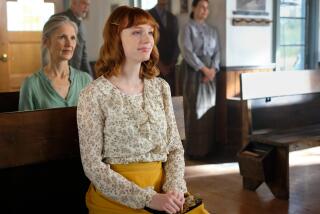TUSTIN : Mother Keeps Hope Alive for Daughter
- Share via
Although 17-year-old Kami Wallace’s condition has improved since an auto accident last November left her in a coma, she still has a long road to recovery.
The steps she has taken, albeit small, have been joyful milestones for her mother, Alice Dedrick, 37, of Fullerton.
Kami’s clear blue eyes now focus on people and follow them. Occasionally she speaks, saying “Yes,” “No,” or “I love you.” She breathes on her own and can eat pureed food. She is able to go home in a wheelchair for visits with family and friends.
But this week, Dedrick faces a dilemma because the insurance coverage for her daughter’s care will end. Although she will be covered for acute care under the family’s Kaiser Permanente insurance policy, none of her care at Western Neuro Care Center will be covered.
Dedrick, whose 10-year-old son was killed in the same accident, is determined that her daughter will continue to improve.
“As much as I want Kami to come home, I’ve done my homework and this is the best place in the nation,” Dedrick said.
At Western Neuro Care Center in Tustin, Kami receives speech, physical and occupational therapy, hygiene, grooming and around-the-clock nursing care. The center specializes in patients with head trauma, and won a national award three years ago.
“One hundred and sixty days is how much time she’s gotten,” said Donna Donan-Drasner, director of public affairs for Kaiser Permanente. “I think it’s important to realize that Kami is in a persistent vegetative state. At some point, the care that people like Kami need is custodial. . . . If her mother opts to bring her home, we would send out home health nurses and so forth until she learns to care for Kami herself.”
Although Dedrick is eager to bring Kami home, she wants to wait until her daughter no longer needs the intensive therapy she would be unable to provide. Her other option is becoming a Medi-Cal patient and transferring her daughter to a lower-cost, less-specialized facility where she would receive less-intensive therapy.
John Fenton, chief executive officer of Western Neuro Care Center, said Kami “probably won’t ever walk and she probably won’t ever be a medical student the way her mother wants her to be. But she can have a meaningful life. She hasn’t plateaued. She is continuing to make small improvements. What we’re saying by putting Kami into a facility that doesn’t have the resources to provide this care is that her recovery phase is over.”
“We’re not talking about “Does she have a good day?” or “Does she do well at the races?” We’re talking about her life. “Does she have a future?”
Dedrick, who has covered Kami’s walls with photographs of her friends and family, has dedicated herself to making certain that her daughter does have a future. Lately, she’s felt guilty because a problem pregnancy has kept her from visiting her daughter every day to groom her, make sure she isn’t alone, or try to capture her words on a hand-held tape recorder.
“I picture her with her head not straight on her pillow or if she were to spit up and someone didn’t notice. . . . I’m here 35 to 40 hours a week. That’s my job. I’m not here because I’m supermom. I’m here for my own sanity.”
Medical center staff members describe Dedrick as determined and dedicated.
“Kami’s mom is tenacious,” Fenton said. “She’ll do anything she can for her daughter.”
Dedrick has distributed flyers with Kami’s picture in hope of drumming up donations. A trust fund has been established at United California Savings Bank in Anaheim, where Dedrick worked before the accident. Students at Valencia High School, where Kami was an honor student, have raised $5,000.
While she struggles to deal with the financial details, Dedrick dreams of the day her daughter will regain her quick wit.
“Someday that sarcastic sense of humor is going to cut me down again and make me laugh at myself again,” she said.
More to Read
Sign up for Essential California
The most important California stories and recommendations in your inbox every morning.
You may occasionally receive promotional content from the Los Angeles Times.












